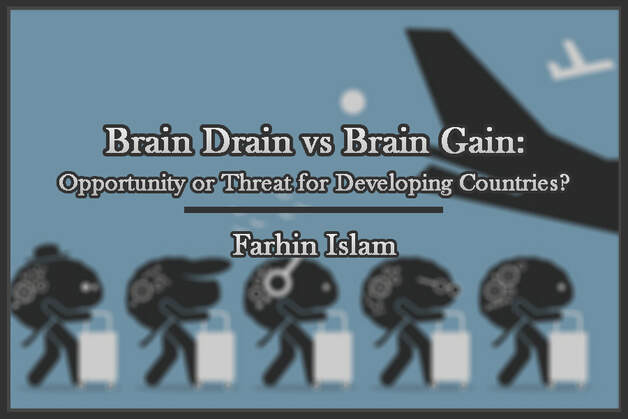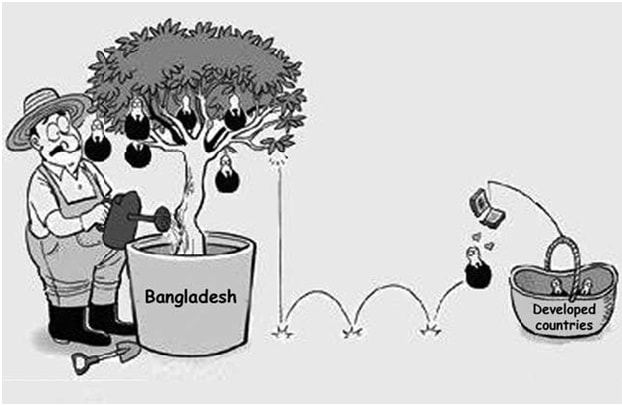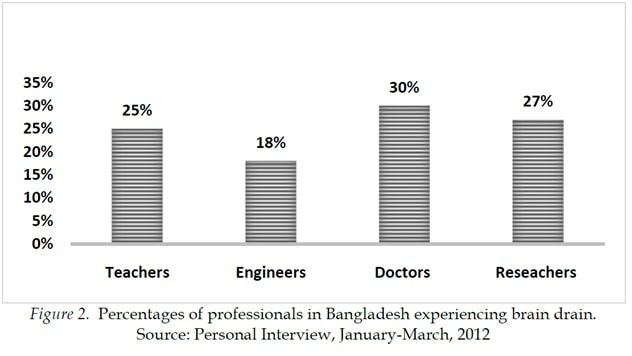ECONOMICS STUDY CENTER, UNIVERSITY OF DHAKA
|
Farhin Islam ‘Brain Drain’ is a process where a worker of any given skill migrates from a developing country to a developed country and receives a higher wage with the same skill set. This phenomenon is an important implication of a theory of economic development called “O-Ring Theory by Michael Kremer”. Kremer’s O-Ring Theory (1993) explains the existence of poverty trap and the reason behind this low-income equilibrium trap that a country is caught in. This model is named after the “Challenger” spaceship disaster in 1986, in which the failure of one small, inexpensive ring-shaped part caused the space shuttle to explode (Todaro, 2015). It proposes that tasks of production must be executed proficiently together in order for any of them to be of high value, which means people with similar skill levels have to work together for development. This means, brain drain hinders development. The main cause of brain drain is sustainable poverty. Developing countries lose educated, talented and high-skilled labor force. There are some push factors and pull factors behind this. Low-paying jobs, poor working conditions, political instability, lack of freedom, employment discrimination, underdevelopment of the home economy are the push factors while better quality of life, high-paying jobs, social security, modernized education, prestige in the foreign country are the pull factors. Since the home country is still a developing one and the foreign country is developed, the home country loses its human capital due to brain drain. This affects the economy by limiting economic growth, loss of entrepreneurship and tax revenue, shortage of important workers, loss of education expenditure and services etc. Though brain drain may imply an increase in remittance earning, the above disadvantages hinder the economic development of the home country. ‘Brain gain’ is a new concept compared to its opposite, discussed above. A large number of educated migrants in developed countries are moving back to their home country. A negative side of this process can be explained with the help of the False-Paradigm Model that says, developing countries have failed to develop because their development strategies (usually given to them by western economists) have been based on an incorrect model of development (Todaro, 2015). Due to brain gain, university intellectuals, and high-level government economists get their training from institutions in developed countries. They learn about models that are inapplicable to their home country, which is a developing one. The models need proper modification to be applicable in developing countries. Although brain gain is considered advantageous for emerging economies, the model mismatch can result in issues in the long run. For example, Moghbazar flyover of Dhaka city was mistakenly designed for left-hand driving, when, in Bangladesh, roads are made for right-hand driving (Dhaka Tribune, 2017). But still, attracting qualified and trained people working or learning abroad back to their home country is more important for our development. Brain drain and brain gain are closely related to skills, training and migration. We can explain ‘Brain Drain’ as gathering the skillset from the home country and working in a foreign country and ‘Brain Gain’ as gathering of skills in the foreign country and returning to the home country for work. Therefore, there must be a skill mismatch in the job sector in the home country. We lack proper jobs for high-skilled labor (cause of Brain Drain) and we do not have a proper education system to provide certain high-level skills (initial cause of Brain Gain). Only reforms in the system of education and employment can solve this mismatched puzzle. We can conclude that both Brain Drain and Brain Gain have some positive and negative effects on an emerging economy. But the loss due to brain drain is more hazardous for a country like Bangladesh while brain gain is equally important for development despite having some negative consequences. References
1. Dhaka Tribune, 2017. PM Hasina inaugurates Mouchak-Moghbazar flyover. 26 October. 2. Francis, J., n.d. What is Brain Drain in Economics? - Definition, Causes, Effects & Examples. [Online] Available at: https://study.com/academy/lesson/what-is-brain-drain-in-economics-definition-causes-effects-examples.html [Accessed August 2019]. 3. Gitau, S. G., n.d. Brain Gain and the potential shifts in Higher Education. [Online] Available at: https://www.qs.com/brain-gain-and-the-potential-shifts-in-higher-education/ [Accessed August 2019]. Todaro, M. P., 2015. Economic Development. 12 ed. New York: Pearson Education Inc..
0 Comments
Leave a Reply. |
Send your articles to: |




